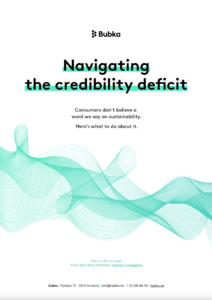The transition to a sustainable world offers interesting opportunities for the business world. We just don’t succeed in communicating about it in a credible way. That’s why Wim Vermeulen, Director of Strategy & Sustainability at Bubka, together with Prof. Dr. Gino Verleye (UGent and VUB) and iVox, analysed 100 different advertising campaigns that talk about sustainability.
Thank you for reading this post, don't forget to subscribe!
The results were striking. Only 9.7% of consumers found these sustainability campaigns credible.
And that is a pity, because Belgian consumers have lost faith in governments to guide us safely through the transition to a sustainable world (93% indicate they have lost faith). Instead, a large majority of Belgians prefer to look to the business world (no less than 83%). So there are great opportunities for companies, but the potential is hardly being exploited because we fail to communicate credibly about our sustainable efforts. So we have a credibility deficit.
Of course, it does not help that 59% of the Belgian advertising campaigns on sustainability can be labelled as greenwashing. On top of that, most sustainability claims can neither be proven nor substantiated.
There is therefore a need to communicate about sustainable efforts and sustainable products in a different way. The storytelling we use for this purpose follows different rules than the storytelling we use to market conventional products.
That is why the Antwerp advertising agency Bubka went in search of what makes sustainability communication credible. Research conducted in collaboration with Prof. Dr. Gino Verleye (UGent and VUB) and iVox identified the five most important driving factors. Those 5 drivers of credible sustainability communication can be found in the white paper ‘Navigating the credibility deficit – Consumers con’t believe you when you talk sustainability. Now what?
Based on that research, Bubka also developed a Fast Check. It allows you to easily find out how credible your sustainability communications are and how big the risk is that your target audience will label them as greenwashing.
Interested in this white paper and the 5 most important drivers for credible sustainability communication?.




